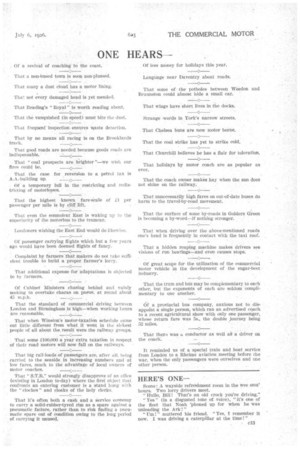ONE HEARS
Page 3

If you've noticed an error in this article please click here to report it so we can fix it.
Of a revival of coaching to the coast. That a non-bused town is soon non-plussed.
That many a dust cloud has a motor lining. That not every damaged head is yet mended. That Reading's "Royal" is worth reading about.
That the vanquished (in speed) must bite the dust.
That frequent inspection ensures Waste detection.
That by no means all racing is on the Brooklands track. • ' That good roads are needed because goods roads are indispensable.'
That "coal prospects are brighter "—we wish our fires could be.
That the case for . reversion to a petrol tax is A.A.-building up.
, Of a temporary lull in the restricting and redistricting of motorbuses.
That the highest known fare-sale of £1 per passenger per mile is by cliff lift.
That even the somnolent East is waking up to i he superiority of the motorbus to the tramcar.
Londoners wishing the East End would do likewise.
Of passenger carrying flights which but a few years ago would have been deemed flights of fancy.
Complaint by farmers that makers do not take sufficleat trouble to build a proper farmer's lorry.
That additional expense for adaptations is objected to by farmers.
Of Cabinet Ministers chasing behind and vainly seeking to overtake charas on miens. at round about 45 m.p.h.
That the standard of commercial driving between London and Birmingham is high-7---when working hours are reasonable.
That when Winston's motor-taxation schedule came out little different from what it went in the sickest people of all about the, result were the railway groups.
That some £100,000 a year extra taiation in respect of their road motors will now fall on the railways.
That big rail-loads of passengers are, after all, being carried to the seaside in increasing numbers and at low fares, much to the advantage of local owners of motor coaches.
That " S.T.R." would strongly disapprove of an office (existing in London to-day) where the first object that confronts an entering customer is a stand hung with the "cloches" and cloaks of the lady clerks.
That it's often both a Cash and a Service economy to carry a solid-rubber-tyred rim as a spare against a pneumatic failure, rather than to risk finding a pneumatic spare out of Condition owing to the long period of carrying it unused. Of less money for holidays this year. Language -near Daventry about roads.
That some of the potholes between Weedon and 13rauriston could almost hide a small ear.
That wings have short lives in the docks.. Strange •words in York's narrow streets.
That Chelsea buns are now motor borne.
That the coal strike has yet to strike cold.
That Churchill believes he has a flair for toleration.
That holidays by motor coach are as popular as ever.
That the coach owner makes hay when the sun does not shine on the railway.
That unnecessarily high fares on out-of-date buses do harm to the travel-by-road movement.
That the surface of some by-roads in Golders Green is becoming a by-word-4f nothing stronger. .
• 0 That when driving over the above-mentioned roads one's head is frequently in contact. with the taxi roof.
That a hidden reaping machine makes drivers see visions of run bearings—and even causes stops, Of great scope for the utilization of the commercial motor vehicle in the development of the sugar-beet' industry.
That the tram and bus may be complementary to each other, but the exponents of each are seldom Complimentary to one another.
Of a provincial bus company, anxious not to disappoint a single person, which ran an advertised coach to a recent agricultural show with only one passenger, whose return fare was 5s., the double journey being 52 miles.
That then was a conductor as well Aa driver on the coach.
It reminded us of a special train and boat service from London to a Rheims aviatioumeeting before the war, when the only passengers were ourselves and one other person.
HERE'S ONE Scene: A wayside refre`shment room in the wee sma' hours. Two lorry drivers meet.
"Hullo, Bill! That's an old crock you'se driving," " Yes " (in a disgusted tone of voice), "it's one of the fleet that Noah 'phoned up for when he was unloading the Ark!"
"Um!" muttered his friend. "Yes, I remember it now. I was driving a caterpillar at the time!"
















































